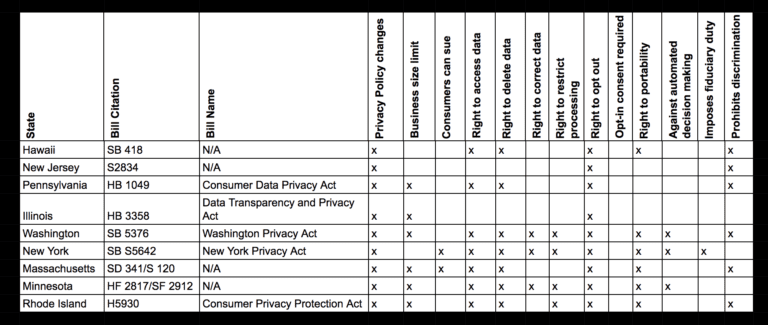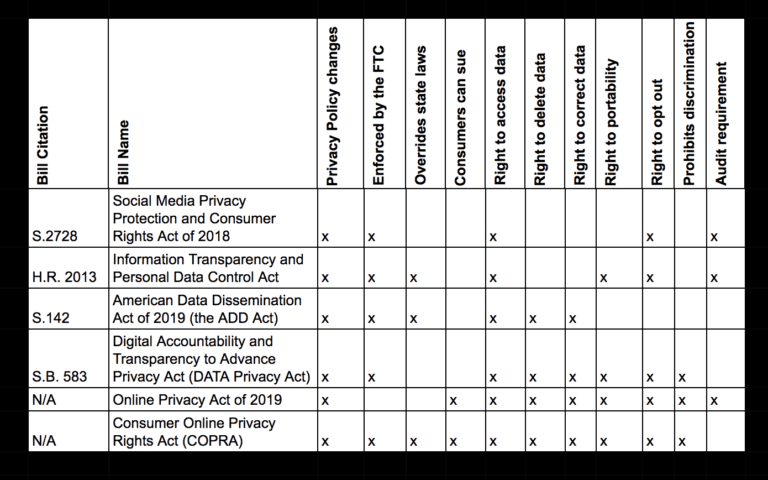
Will Your Website Policies be Compliant in 2020?
States across America are creating new website policies and laws to help protect its citizens. The problem here is that citizens visit websites that are located beyond state lines as well as countries borders.
In the past, you may have heard about GDPR (General Data Protection Regulation) a regulation in EU law on data protection and privacy for all individual citizens of the European Union and the European Economic Area. It also addresses the export of personal data outside the EU and EEA areas (Wikipedia). Though, what some may not know is that even though you may not do business directly with customers in the EU and EEA areas, you are still required to be compliant regardless and may still face Fines and Penalties.
Nevada updated its privacy law on October 1st, 2019. Then on January 1st, 2020, California’s new law came into effect – The California Consumer Privacy Act (CCPA), AKA “California GDPR”.
So what does this mean?
Any website that collects as little as an email address on a contact form is collecting ‘Personally Identifiable Information’ which means your website needs to have a compliant and regularly updated Privacy Policy. If you have an old outdated Privacy Policy that does not meet these new standards, you are not in compliance. If you do not regularly update your Privacy Policy, you could be at risk.
Why You Need Policies…
- Avoid massive fines from the government
- Limit your liability
- Keep control of your website
- Protect your intellectual-property
- Ensure legitimacy to your website visitors
- To be able to utilize digital marketing and retargeting services
2019 was a pretty intense time in the privacy field. Numerous privacy bills were introduced, dozens of GDPR fines were issued, and consumers and legislators showed more interest in the protection of privacy online. Now that we have run in the new year, we are asking ourselves what 2020 holds for one of the hottest and new topics of the decade: Privacy.
Here are 5 Predictions in Website Privacy for 2020:
(1) More states will propose privacy laws: As of right now, 9 states have proposed privacy bills that would require certain websites that collect Personally Identifiable Information (PII) to have a Privacy Policy. Some of these bills apply to businesses outside of these states. Other states are proposing that consumers have the right to sue businesses directly for not having a compliant Privacy Policy.
Since multiple state privacy laws can apply to a single business, we anticipate that it will become more and more difficult for small businesses to keep track of these changes.

(2) More state privacy laws will go into effect: The regulation of privacy online will be a top priority for some states, such as Washington. Thus, we anticipate seeing more privacy bills passed into law in 2020 than we saw in 2019.
(3) Progress will be made on a federal level: As of right now, there are six proposed federal privacy bills that aim to centralize privacy requirements across the United States. All of these bills would require websites that collect personally identifiable information online to have a Privacy Policy. What’s really interesting is that some of these privacy bills would not override state privacy laws, meaning that businesses would have to comply with a federal law and multiple state laws, further complicating compliance. While we do hope to see a federal privacy law, we anticipate states taking the lead on this issue.

(4) IAPP also thinks more states will propose laws, and will format them similar to CCPA: The International Association of Privacy Professionals has predicted that more states will pass privacy laws that are modeled on the California Consumer Privacy Act (CCPA). We tend to agree with this prediction for 2020 since most state privacy bills cite the CCPA as inspiration and argue that the citizens of their states deserve the same privacy rights as Californians.
(5) Swift enforcement starting 07/01 for CCPA: The CCPA went into effect on January 1st, 2020 and will start to be enforced by the California Attorney General on July 1st, 2020. We predict that enforcement will be swift and fines will start to be issued early in July for non-compliance.
As you can see, privacy is only going to become more important in 2020 and more requirements are going to be placed on businesses to protect the privacy of consumers online.
Do you have the time or legal expertise to update these regularly to comply with the law changes?
With all of these emerging changes in law, we have decided to become an affiliate partner with an agency that provides policies for your website that automatically update whenever the law changes that are written and updated by real software Attorneys…not robots.
These Auto-Generating and Auto-Updating policies are tailored to fit your business and integrate directly into your website to provide Real Time updates as laws change to help you to be compliant with these coming changes.
Nearly a complete set it and forget it solution.
Quickly generate and embed all the policies you need for your website. Then walk away, let the system take care of the rest. As the law changes, the agency automatically updates the policy for you and will notify you of changes. The only changes that you will need to make on your end, is if your business information changes, contact information changes, or a few other changes to any of your websites, such as being an affiliate, using new 3rd party software, marketing, etc. Which only takes a couple minutes to update, and BAM! You are done. and you can just set it and forget it.
Please note: Conceptualized Design and our Affiliate are not lawyers, and these policies should always be reviewed by your own legal council to ensure they work specifically for your business. These policies can be manually override to rewrite certain aspects of the policies to be tailored specifically to your business after reviewing with your legal council.
Is your business compliant? Not sure where to start?
Keep your website compliant and avoid being fined and sued, potentially costing thousands of dollars, per occurrence for being non-compliant.
To get started to make your website compliant, there is a one-time setup fee of $100 to build out your policies (Terms and Conditions, Privacy Policy, Disclaimer, or End User License Agreement) to be tailored to your specific business and integrate them into your website. After the initial setup, it is $10/month ($99/year)* for keeping the business website compliant with real time updates and changes.
To get started, email us at [email protected], or Visit Our Website and send us a message and we can get started on setting up your website for compliance.
*If you have a hosting with us the payment will be set to how your current hosting payment is paid (monthly or yearly)
